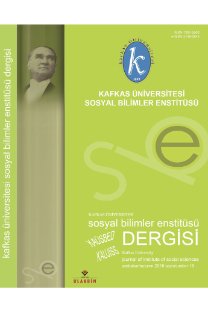DEATH OF “THE” HISTORY: ALTERNATIVE AND PARTIAL (HI)STORIES IN JULIAN BARNES’S A HISTORY OF THE WORLD IN 101/2 CHAPTERS AND SALMAN RUSHDIE’S MIDNIGHT’S CHILDREN
“Tekil” Tarihin Ölümü: Julian Barnes’ın On Buçuk Bölümde Dünya Tarihi ve Salman Rushdie’nin Geceyarısı Çocukları Romanlarında Alternatif ve Taraflı Er-Tarih/Öyküler
___
Irwin, J. B. (2010). Arlington national cemetery. Web. November 11. http://www. arlingtoncemetery.net/jbirwin.htmAristotle. (2008). Poetics. New York: Cosimo Classics.
Barnes, J. (2012). A history of the world in 101/2 chapters. Canada: Ransom House of Canada.
Benjamin, Walter. (1992). Illuminations. (1958) Hannah Arendt (Ed.) and Harry Zohn (trans.). London: Fontana.
Bentley, N. (2008). Contemporary British fiction. Edinburg: Edinburg University.
Bertens, H. (1986). The postmodern weltanschauung and its relation with modernism: An introductory survey. Approaching Postmodernism: Papers presented at a Workshop on Postmodernism, 21-23 September 1984, University of Utrecht.
Brannigan, J. (1998). New historicism and cultural materialism. New York: St. Martin’s.
Buxton, J. (2000). Julian Barnes’s theses on history (In 10½ Chapters). Contemporary Literature, 41(1), 56-86. The holy bible according to the authorized version (A.D. 1611): Ezekiel. Daniel, and the minor prophets. (1876). F. C. Cook (Ed.). London: J. Murray.
Dhar, T. N. (1993). Problematizing history with Rushdie in ‘midnight’s children’. Journal of South Asian Literature, 28(1/2), 93-111.
Doctorow, E.L. (1983). False documents. Trenner, 16–27.
Eagleton, T. (1996). The illusions of postmodernism. UK: Blackwell.
Foucault, M. (1977). Nietzsche, Genealogy, History. Donald F. Bouchard (Ed.) Language, Counter-Memory, Practice: Selected Essays and Interviews (pp.139-64). Ithaca: Cornell University Press.
Foucault, M. (1980). Power/knowledge: Selected interviews and other writings, 1972-1977. New York, Pantheon Books.
Freiburg, R. & Schnitker, J. (Eds). (1999). Do you consider yourself a postmodern author?: Interviews with Contemporary English Writers, Münster: LIT.
Gallagher, C. & Greenblatt, S. (2020). Practicing new historicism. USA: University of Chicago.
Geçikli, K. (2016). Edebiyatta yeni tarihselcilik. Cumhuriyet Üniversitesi Sosyal Bilimler Dergisi, 40 (1), 173-188.
Howard, J. (1986). The new historicism in renaissance studies. English Literary Renaissance 16, 13-43.
Hutcheon, L. (2003). A poetics of postmodernism: History, theory, fiction. United Kingdom: Taylor & Francis.
Jameson, F. (1998). The cultural turn: Selected writings on the postmodern, 1983- 1998. United Kingdom: Verso.
Locke, R. (1989). Flood of Forms. The New Republic. 201(23), 40-3.
Lyotard, J.-François. (1984). The postmodern condition: A report on knowledge. Geoff Bennington and Brian Massumi (Trans.). Minneapolis: University of Minnesota.
Marshall, B. K. (1992). Teaching the postmodern: Theory and Fiction. New York: Routledge.
McHale, B. (2004). Postmodern fiction. London and New York: Routledge.
Moseley, M. (1997). Understanding Julian Barnes. Colombia: University of South California.
Rozett, M. T. (2003). Constructing a world Shakespeare’s England and new historical fiction. Albany: State University of New York Press.
Rubinson, G. J. (2000). History’s genres: Julian Barnes’ ‘a history of the world in 10 ½ chapters.’ Modern Language Studies, 30(2), 159-179.
Rushdie, S. (1991). Julian Barnes. Imaginary homelands: Essays and criticism, 1981-1991 (pp. 241-43). London: Granta.
Rushdie, S. (2006). Midnight’s Children. London: Vintage.
Selden, R. & Peter W.. (1993). A reader’s guide to contemporary literary theory. Lexington, Ky.: University Press of Kentucky.
Taniyan, B. (2015). Denying the narrator: Julian Barnes’s the sense of an ending.
Mehmet Ali Çelikel, Baysar Taniyan (Eds.). English Studies: New Perspectives (pp.52-59). Newcastle upon Tyne: Cambridge Scholars Publishing.
The Random House Webster’s Unabridged Dictionary. (1993). 2nd Edition, Stuart Berg Flexner (Ed.). New York: Random House.
Veeser, H. A. (1989). The new historicism. New York: Routledge.
Walcott, D. (2003). The muse of history. Bill Ashcroft, Gareth Griffiths and Helen Tiffin (Eds.). The Post-colonial Studies Reader (pp.329-332). London and New York: Routledge.
- ISSN: 1307-5500
- Yayın Aralığı: 2
- Başlangıç: 2008
- Yayıncı: Kafkas üniversitesi Sosyal Bilimler Entitüsü
TÜRKİYE’DE 1945-1950 DÖNEMİNDE DIŞ POLİTİKA
STRUCTURAL ANALYSIS OF HANDLES OF HIGHLY CURVED IRANIAN SWORDS
Manouchehr Moshtagh KHORASANI, Nima ARJMANDI
AVUSTURYA’DA OSMANLI TARİHÇİLİĞİNİN PROFESYONEL BİR DİSİPLİNE DÖNÜŞÜM SÜRECİ
DESTİNASYON PAZARLAMASININ BİR BİLEŞENİ OLARAK SOKAK LEZZETLERİNİN DEĞERLENDİRİLMESİ: İZMİR ÖRNEĞİ
MALKOÇOĞLU BALİ BEY VE MEZARI HAKKINDA
KARS’IN AHŞAP DESTEKLİ KÖY CAMİLERİ
DİJİTAL MEDYA AKTİVİZMİ: YENİ SINIFSAL İLİŞKİLERİN İMKAN VE SINIRLARI
